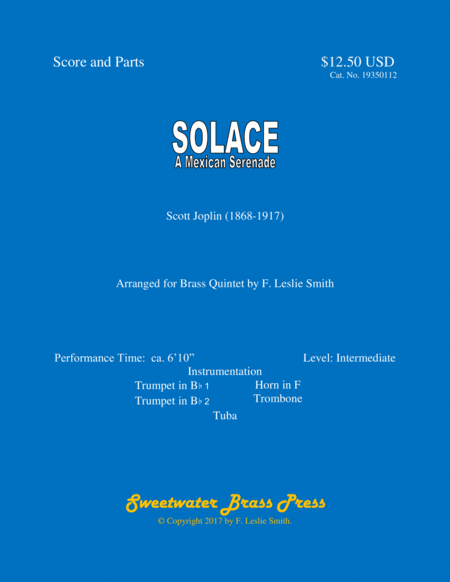Brass Ensemble - Level 3 - Digital Download SKU: A0.808676 Composed by Scott Joplin (1868–1917). Arranged by F. Leslie Smith. 20th Century,Film/TV,Folk,Holiday,Love,Ragtime. Score and parts. 20 pages. Sweetwater Brass Press #3213035. Published by Sweetwater Brass Press (A0.808676). Marvin Hamlisch’s score for the 1973 movie The Sting revived interest in ragtime music. Ragtime, of course, is music, often in march-time, that features syncopation, a ragged beat. It originated in African-American districts of large cities and first flourished during the period, 1895-1918. One of the most successful ragtime composers was Scott Joplin, known as the King of Ragtime. Hamlisch used several Joplin compositions as background music for the George Roy Hill-directed film, and one of those was this beautiful and contemplative 1909 composition, Solace: A Mexican Serenade. In All Music Guide to Classical Music: The Definitive Guide to Classical Music (Woodstra et al., ed., CMP Books: 2005), Blair Johnston called Solace a musical hybrid neither authentically Mexican nor authentic ragtime. It is, instead, a habanera, but also a very lovely piece of Americana. This brass quintet arrangement of Solace was adapted from the Joplin piano score. Like the score, this arrangement is in 2/4 time and contains a lot of 16th notes. Joplin’s tempo instruction, however, is Very slow march time, and the metronome marking suggests 96 eighth notes a minute, so in reality the actual tempo is an andante 4/8. Trumpet 1 has some B-above-the-staff notes in the last section, Trumpet 2 has a few interesting rhythmic figures in section B; Trombone has 3 or 4 F-above-the-staff notes, and Tuba plays a couple of top-of-the-staff A’s in section D and at the very end. Plus, of course, the piece is syncopated. Completed in 2017, this arrangement runs about 6 minutes, 10 seconds. Contact the arranger, Les Smith, at lessmith@ufl.edu; he would be delighted to hear from you. For more arrangements by Les, enter Sweetwater Brass Press (without the quotation marks) in the SheetMusicPlus search box.
